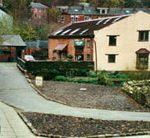When my son, Matt, was born, he was delivered at home with the help of a midwife, one amazing older lady; and I use to word “lady’ because that’s what she represented to me at that time. An extremely considerate person who knew that her job was about more than just ticking boxes and who used all her years of experience to make sure that baby and parents received the physical and emotional support that they needed during a time of great stress. She arrived at about 9 pm and left, job done, at about 3 am. I won’t say that they don’t make them like that anymore although I do know that she seemed to be very much a product of her generation and I was extremely grateful that she was.
Now this blog isn’t a homage to those times, rather it’s the fact that we called her as it got dark; something I mentioned to her at the time. Her reply was to the effect that it was often that way in her job as people start to worry more when it got dark and they felt more on their own.
So what is all this about, you might ask? Well, I currently have a toothache and an appointment for it to be dealt with in the next 48 hours. So, I’m taking painkillers and antibiotics in the meantime. These have dulled the pain and seem to be helping with the infection. Toothache, however, is a particular worry to me as I know that, whatever else happens, it will likely get worse until it’s dealt with. I also know that, whenever I have something that worries me a great deal, I always seem to wake at about the same time. So, what is it about 3.30 am?


